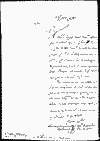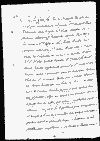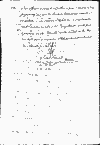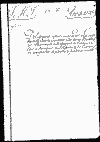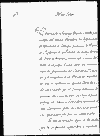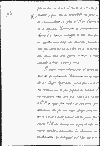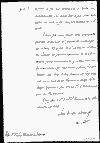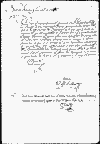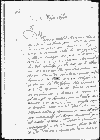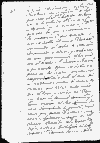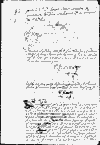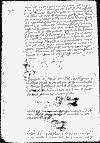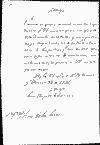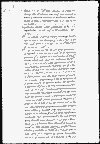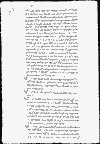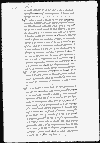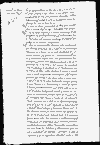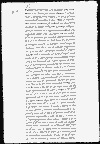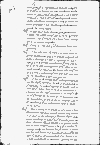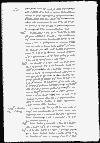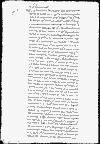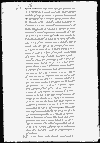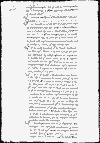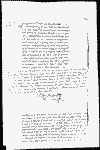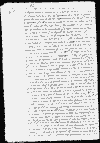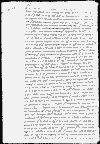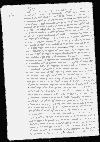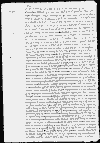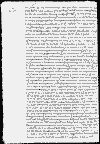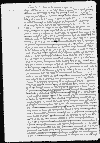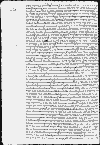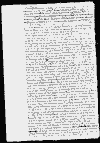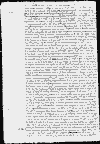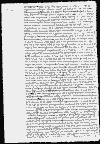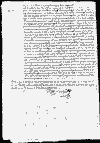
4.993
Almonester y Roxas, Andres and Fran(cis)co
Pascalis de la Barre
New Orleans, (Louisiana)
to Bishop Luis Penalver y Cardenas
(New Orleans, Louisiana)
Having read in the Cabildo the Bishop's letter of February 4
concerning the "feria" to be held in the Cathedral on the Sundays
of Lent, they took the resolution which appears in the enclosed
document.
Enclosure:
--------
1796 Feb. 5
Pedesclaux, Pedro
New Orleans, (Louisiana)
Pedesclaux certifies that the following persons were present that day in the Cabildo: Manuel Perez, Lieutenant Colonel of the Royal Armies, Senior Judge and President of the Cabildo, Carlos de Lachaise, Junior Judge, Andres Almonster y Roxas, Colonel of the Battalion of Militia and Alderman Ensign, Nicolas Forstall, Alderman, Rudolfo Josef Ducros, Alderman, and Gabriel Fonvergue, Attorney-General, and that the Bishop's letter having been read, since the Cabildo does not go out in a body except on those days determined in the list and since the members of the Cabildo are few and have many occupations, the above mentioned members agreed that those who would be in town would, to please the Bishop, assist at the meetings to give good example to the people. In compliance with the above, Pedesclaux drew up this certified copy.
IV-5-f A.L.S. 3pp. 4to. (Spanish)
9
1796 Feb. 5
Duarte, Santiago
Documents concerning the immunity to which Santiago Duarte, grenadier of the Third battalion of the Regiment of infantry of Cuba, sought in the parochial church of St. Augustine de Florida, and of his consignment to the military jurisdiction.
--------
1795 Dec. 18
Casas, Luis de las
(Havana)
to Bishop (Luis) Penalver y Cardenas
(New Orleans)
Las Casas states:
1. That Santiago Duarte, soldier grenadier of the third battalion
of the regiment of infantry of Cuba stationed at San(?) Augustin of
Florida, has been convicted of the crime of high treason by
seducing several soldiers of his own corps to cut off the garrison
of the Castle of San(?) Marcos and deliver it to the French
prisoners incarcerated there. Therefore he was condemned
unanimously to be hanged by the council of war and the sentence
being sent to Havana was confirmed by Las Casas.
2. That in the meantime Santiago Duarte fled from prison and took
refuge in church. However since his crime is of the kind that does
not enjoy immunity and exception, the formal delivery of the
criminal was asked of the ecclesiastical judge of that province.
He did not accede unless under sworn security, because as it
appears from his official letter on page 105, he does not have
faculties to do otherwise.
3. That accordingly the governor of that province sent the
original documents of the case to Las Casas that he might determine
the rights in the case. Las Casas did not find any other way out
than to have recourse to Bishop Penalver y Cardenas as he is doing
in the present official letter with the original documents in 108
pages in order that the Bishop may order the cancellation of the
sworn security.
4. That since on the one hand all that concerns the delivery of
the criminal is finished and on the other his immediate execution
interests the good of the state for warning and check of those ill-
contented and seditious and little faithful vassals of the King, of
whom, it seems that there is no scarcity in the province, Las Casas
is sending the original documents which the Bishop is to return
with his decision. This is signed by Luis de las Casas.
--------
1796 Jan. 2
Penalver y Cardenas, Luis Bishop
(New Orleans)
1. The Bishop states that he has examined the criminal procedures
against Santiago Duarte sent to him by Luis de las Casas in the
official letter of Dec. 18, 1795.
2. The Bishop decrees that such procedures and official letter be
handed over to Father Patricio Walsh who as ecclesiastical
Attorney- General will determine the rights of the case.
Signed by the Bishop of Louisiana and witnessed by Rivas.
--To this is added a note by Rivas certifying that, on the same
day, he notified Father Patricio Walsh of the above decree and
delivered the procedures.
--------
1796 Jan. 9
Walsh, Father Patricio
(New Orleans)
to Bishop Penalver y Cardenas
(New Orleans)
Father Patricio Walsh states:
1. That he has examined very carefully the original procedure
sent to the Bishop Luis de las Casas.
2. That he was informed thoroughly of the pontifical resolutions
and declarations, particularly of those quoted by the military
judge of St. Augustine on page 100 of the procedures, which
regulate the present case.
3. That since Santiago Duarte, convicted of high treason, has
been condemned to be hanged and the sentence was confirmed by Luis
de las Casas, and since such criminals are excepted from the refuge
in church, Father Patricio Walsh thinks that Bishop Penalver y
Cardenas can order the Pastor and Vicar of St. Augustine of Florida
to make the formal consignment and delivery of the criminal and
cancel the sworn security given by Manuel Martinez, major assistant
of the third battalion of the regiment of Cuba, as the governor
Luis de las Casas has demanded, unless the Bishop has a better
suggestion.
Signed by Father Patricio Walsh.
--To this is added a decree by Bishop Penalver y Cardenas ordering
the proceedings to be brought in.
Signed by the Bishop.
--To this is added a note by Rivas certifying that the above decree
was issued and signed by the Bishop on Jan. 9, 1796.
--To this is added another note by Rivas certifying that, on the
same day, he notified Father Patricio Walsh of the above decree.
--------
1796 Jan. 14
Penalver y Cardenas, Luis Bishop
(New Orleans)
The Bishop decrees:
1. That he has examined the results of the original process sent
by Luis de las Casas and what has been decided by the
ecclesiastical Attorney-General appointed on this question.
2. That since Santiago Duarte's crime is an exception sufficient
for his consignment to the military jurisdiction, the sworn
security is cancelled, even though he can recur to what is right
because the canonical dispositions on the matter remain in force.
3. That an official letter with the present decree is to be sent
to Luis de las Casas, the original proceedings being included
family. Despuig asserts that this request is just. He asks
Penalver to do all in his power to fulfill one of these two
desires.
L.S. (Spanish) Enclosure:
--------
1796 Mar. 12
Domine, Saturnino
Seville, (Spain)
to Archbishop Antonia Despuig y Dameto
Seville, Spain
Antonio Argote, Domine's brother-in-law, took a ship at Cadiz for New Orleans in 1780, leaving his wife, Maria del Carmen, and his little daughter in Domine's care. Argote was not able to return to Spain at the end of the first year, as he had promised. He had been sending money to support his family but this was not sufficient. All his family wanted was for him to return and to pay back to Domine what he had spent for Argote's family. Argote could not do that because he said his creditors in Cadiz would pursue him. He proposed instead that his wife go to the King to ask him to order Argote back to Spain. This was done and Argote was notified by Governor Miro. Argote failed to return and stopped sending money. Domine and Argot's wife went to the Baron (Francisco Luis Hector) de Carondelet to see whether he could get Argote to come back or at least to send money to his family. The Governor did not even answer the letter. All they got was a letter from Francisco Rendon asking Argote's wife's permission for Argote to go with Rendon to Zacatecas. Domine begs the Bishop's cooperation in getting Domine's answer to Rendon and in helping in Argote's return. Domine wants Argote to refund the 6000 pesos he owes him after the 16 years in which he has been taking care of Argote's family and to send monthly allowances from now on.
A.L.S. (Spanish)
IV-5-h L.S., A.L.S. (Spanish) 5pp. 4to.
